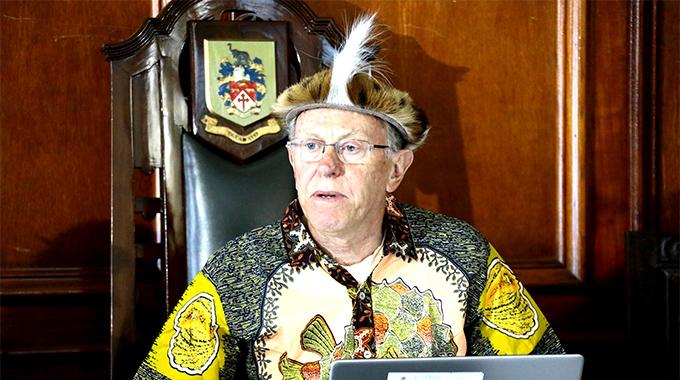News / National
'Garwe must not bully the mayor'
12 hrs ago | Views

Opposition party ZAPU has come out strongly in defence of Bulawayo mayor David Coltart, following a public rebuke by Local Government minister Daniel Garwe over the mayor's decision to host self-proclaimed Ndebele king Bulelani Khumalo.
Garwe recently demanded an explanation from Coltart, labelling Bulelani a "charlatan" and questioning the legitimacy of his visit to the Bulawayo City Council.
ZAPU president Sibangilizwe Nkomo denounced Garwe's remarks, accusing him of attempting to bully the mayor and undermine Ndebele cultural traditions.
"We know there are people with a hidden agenda who want to remove our Bulawayo mayor because they do not like him," Nkomo said during a press briefing. "We love our mayor and we will defend him. We will not be intimidated by Minister Garwe's bully tactics."
Nkomo said the minister's stance reflected a lingering colonial mentality that continues to dismiss and disrespect traditional institutions, particularly those rooted in Ndebele heritage.
"King Bulelani has the right to visit the mayor just like anyone else," he said. "If we are genuine about decolonisation, Garwe should be at the forefront of recognising all tribal institutions, including kingships. Even the minister himself belongs to a chieftainship."
Nkomo further warned that Garwe's criticism threatened to derail national efforts to foster unity and address historical injustices, including the unresolved issue of the Gukurahundi massacres that took place in the 1980s in Matabeleland and the Midlands.
King Bulelani's spokesperson, Bornwell Khumalo, echoed the sentiments, saying the monarch's visit was cultural, not political.
"The king is focused on preserving our Ndebele culture," he said. "To call him a fraud is not only an insult, it is an attack on our heritage. We are not engaging in politics—we are practising our culture, which the minister clearly does not understand."
The Ndebele kingship, though not officially recognised by the Zimbabwean government, traces its origins to Mzilikazi, who established the Ndebele state in the 19th century after leaving Zululand. His son Lobengula, who was the last officially recognised king, is believed to have died in 1894 during colonial resistance.
Recent years have seen several attempts to revive the Ndebele monarchy, but the state maintains that Zimbabwe is a republic and does not accommodate monarchies.
Despite the government's stance, King Bulelani Khumalo continues to be embraced by segments of the Ndebele community as the rightful heir to the throne, and cultural groups regularly host events and ceremonies in his honour.
ZAPU's support for Coltart signals a broader political and cultural battle over identity, recognition, and respect for traditional institutions within modern Zimbabwe.
Garwe recently demanded an explanation from Coltart, labelling Bulelani a "charlatan" and questioning the legitimacy of his visit to the Bulawayo City Council.
ZAPU president Sibangilizwe Nkomo denounced Garwe's remarks, accusing him of attempting to bully the mayor and undermine Ndebele cultural traditions.
"We know there are people with a hidden agenda who want to remove our Bulawayo mayor because they do not like him," Nkomo said during a press briefing. "We love our mayor and we will defend him. We will not be intimidated by Minister Garwe's bully tactics."
Nkomo said the minister's stance reflected a lingering colonial mentality that continues to dismiss and disrespect traditional institutions, particularly those rooted in Ndebele heritage.
"King Bulelani has the right to visit the mayor just like anyone else," he said. "If we are genuine about decolonisation, Garwe should be at the forefront of recognising all tribal institutions, including kingships. Even the minister himself belongs to a chieftainship."
Nkomo further warned that Garwe's criticism threatened to derail national efforts to foster unity and address historical injustices, including the unresolved issue of the Gukurahundi massacres that took place in the 1980s in Matabeleland and the Midlands.
King Bulelani's spokesperson, Bornwell Khumalo, echoed the sentiments, saying the monarch's visit was cultural, not political.
"The king is focused on preserving our Ndebele culture," he said. "To call him a fraud is not only an insult, it is an attack on our heritage. We are not engaging in politics—we are practising our culture, which the minister clearly does not understand."
The Ndebele kingship, though not officially recognised by the Zimbabwean government, traces its origins to Mzilikazi, who established the Ndebele state in the 19th century after leaving Zululand. His son Lobengula, who was the last officially recognised king, is believed to have died in 1894 during colonial resistance.
Recent years have seen several attempts to revive the Ndebele monarchy, but the state maintains that Zimbabwe is a republic and does not accommodate monarchies.
Despite the government's stance, King Bulelani Khumalo continues to be embraced by segments of the Ndebele community as the rightful heir to the throne, and cultural groups regularly host events and ceremonies in his honour.
ZAPU's support for Coltart signals a broader political and cultural battle over identity, recognition, and respect for traditional institutions within modern Zimbabwe.
Source - southern eye


















